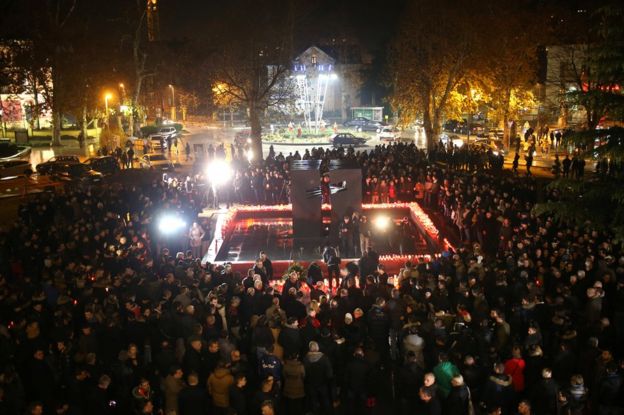Slobodan Praljak, 72, died in hospital on Wednesday shortly after downing a small vial of liquid, which he drank after declaring he was innocent.
His 20-year sentence for war crimes in Bosnia had just been reaffirmed.
Some Bosnian Croats have held vigils to remember a man they regard as a hero.
Croatia's Prime Minister, Andrej Plenkovic, made a scathing attack on the International Criminal Tribunal for the former Yugoslavia (ICTY), which tried him.
The confirmation rulings against Praljak and five other defendants brought an end to more than 20 years of work by the tribunal.
How did he die?
Seconds after hearing his appeal had been lost, the former general declared, "Slobodan Praljak is not a war criminal. I am rejecting the court ruling."
He then drank from a small brown glass bottle and announced, "I have taken poison."
The presiding judge cut short the trial and Praljak was taken to hospital.
He "quickly fell ill" and died in hospital, said ICTY spokesman Nenad Golcevski, adding that he could not confirm what was in the bottle.
What will be the focus of the investigation?
In a brief statement, Dutch prosecutors said the inquiry would look at "assisted suicide and violation of the Medicines Act".
Investigators will look at who gave him the deadly liquid, what it contained and how he managed to smuggle it into what is supposed to be a high-security courtroom, the BBC's Anna Holligan reports from The Hague.
Praljak's suicide was not the first during the Hague trials: Croatian Serb war crimes suspect Slavko Dokmanovic hanged himself in his cell in 1998, and fellow Croatian Serb Milan Babic killed himself in his cell in 2006.
Who was Praljak?
Though allies against the Bosnian Serbs during the 1992-95 civil war, Bosnian Croats and Muslims also fought each other for a period of 11 months, with Mostar seeing some of the fiercest fighting.
Praljak was convicted in 2013 of crimes against humanity committed while commanding Bosnian Croat forces. The ICTY found that he had:
- Failed to make any serious efforts to stop his soldiers rounding up Muslims in the summer of 1993
- Failed to act on information that murders were being planned, as well as attacks on members of international organisations and the destruction of Mostar's historic Old Bridge and mosques
In its final judgement on Wednesday, the ICTY found that he and the five others remained convicted.
However, it did allow part of Praljak's appeal, finding that Mostar's Old Bridge had been a "military target at the time of the attack".
Why do some regard him as a hero?
Croatian Prime Minister Andrej Plenkovic said his death spoke of a "deep moral injustice towards six indicted Croats from Bosnia and the Croatian people".
In Bosnia, Dragan Covic, the Croat member of the tripartite presidency, said his suicide showed "what sacrifice he was ready to make" to show he was not a war criminal.
About a thousand Bosnian Croats gathered in a Mostar square late on Wednesday to light candles in memory of Praljak, Reuters news agency reports.
A Mass in his honour was held in a packed Roman Catholic cathedral, where churchgoers draped themselves in Croatian flags, the agency says.
"I came here to support our generals and pay respect to General Praljak who could not bear injustice and made his final verdict," said Bosnian Croat war veteran Darko Drmac. "He is our pride and hero."
Mostar and all of Bosnia-Herzegovina are still divided on ethnic lines, says the BBC's Jeremy Bowen, who reported from there during the civil war.
At least the war's victims, thousands of whom have been to The Hague, have had some justice thanks to the International Criminal Tribunal for the former Yugoslavia, our correspondent says.
Its work to convict the worst war criminals Europe has seen since the Nazis, he adds, should not be overshadowed by the suicide of Slobodan Praljak.







No comments: